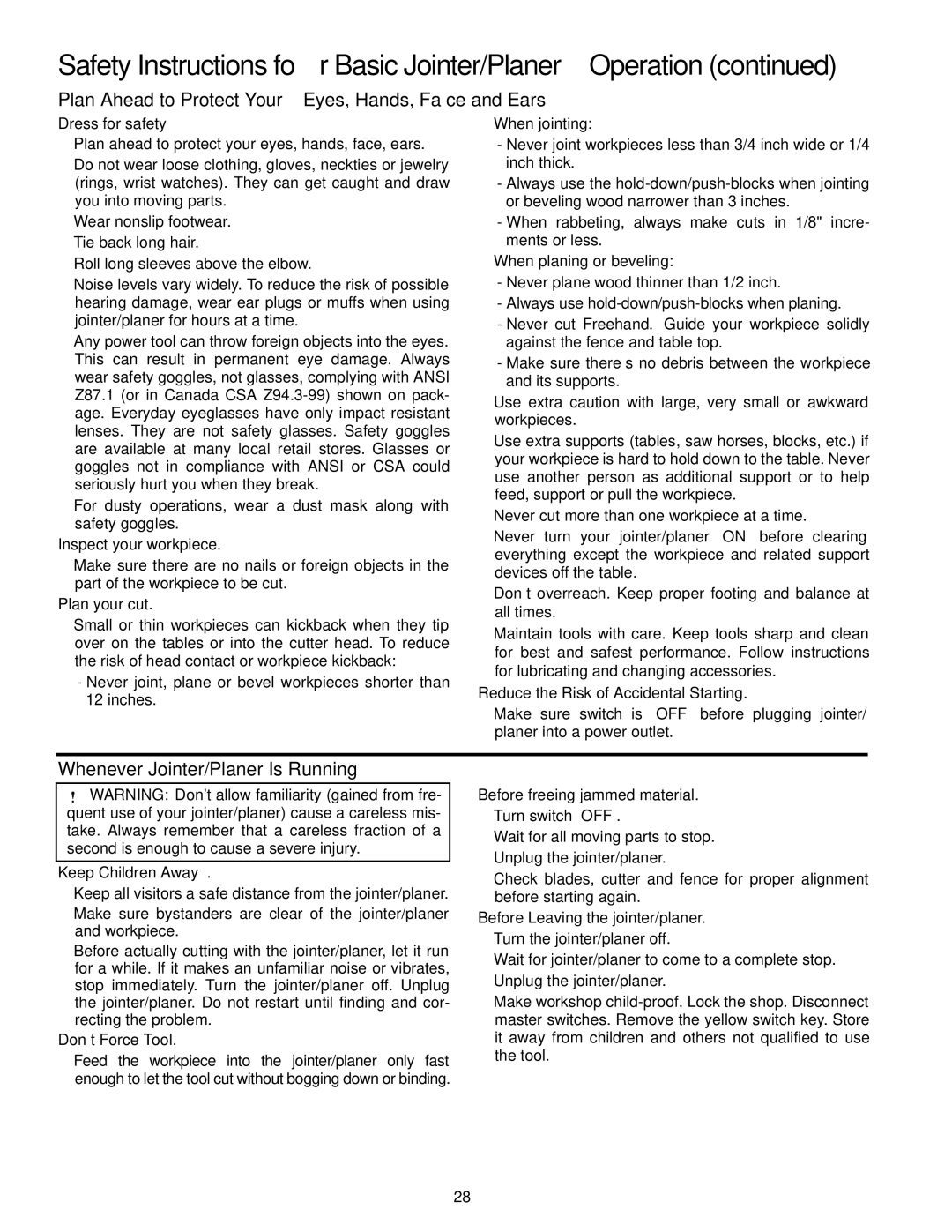
Safety Instructions for Basic Jointer/Planer Operation (continued)
Plan Ahead to Protect Your Eyes, Hands, Face and Ears
Dress for safety
•Plan ahead to protect your eyes, hands, face, ears.
•Do not wear loose clothing, gloves, neckties or jewelry (rings, wrist watches). They can get caught and draw you into moving parts.
•Wear nonslip footwear.
•Tie back long hair.
•Roll long sleeves above the elbow.
•Noise levels vary widely. To reduce the risk of possible hearing damage, wear ear plugs or muffs when using jointer/planer for hours at a time.
•Any power tool can throw foreign objects into the eyes. This can result in permanent eye damage. Always wear safety goggles, not glasses, complying with ANSI Z87.1 (or in Canada CSA
•For dusty operations, wear a dust mask along with safety goggles.
Inspect your workpiece.
•Make sure there are no nails or foreign objects in the part of the workpiece to be cut.
Plan your cut.
•Small or thin workpieces can kickback when they tip over on the tables or into the cutter head. To reduce the risk of head contact or workpiece kickback:
-Never joint, plane or bevel workpieces shorter than 12 inches.
•When jointing:
-Never joint workpieces less than 3/4 inch wide or 1/4 inch thick.
-Always use the
-When rabbeting, always make cuts in 1/8" incre- ments or less.
•When planing or beveling:
-Never plane wood thinner than 1/2 inch.
-Always use
-Never cut Freehand. Guide your workpiece solidly against the fence and table top.
-Make sure there’s no debris between the workpiece and its supports.
•Use extra caution with large, very small or awkward workpieces.
•Use extra supports (tables, saw horses, blocks, etc.) if your workpiece is hard to hold down to the table. Never use another person as additional support or to help feed, support or pull the workpiece.
•Never cut more than one workpiece at a time.
•Never turn your jointer/planer “ON” before clearing everything except the workpiece and related support devices off the table.
•Don’t overreach. Keep proper footing and balance at all times.
•Maintain tools with care. Keep tools sharp and clean for best and safest performance. Follow instructions for lubricating and changing accessories.
Reduce the Risk of Accidental Starting.
•Make sure switch is “OFF” before plugging jointer/ planer into a power outlet.
Whenever Jointer/Planer Is Running
![]() WARNING: Don't allow familiarity (gained from fre- quent use of your jointer/planer) cause a careless mis- take. Always remember that a careless fraction of a second is enough to cause a severe injury.
WARNING: Don't allow familiarity (gained from fre- quent use of your jointer/planer) cause a careless mis- take. Always remember that a careless fraction of a second is enough to cause a severe injury.
Keep Children Away.
•Keep all visitors a safe distance from the jointer/planer.
•Make sure bystanders are clear of the jointer/planer and workpiece.
•Before actually cutting with the jointer/planer, let it run for a while. If it makes an unfamiliar noise or vibrates, stop immediately. Turn the jointer/planer off. Unplug the jointer/planer. Do not restart until finding and cor- recting the problem.
Don’t Force Tool.
•Feed the workpiece into the jointer/planer only fast enough to let the tool cut without bogging down or binding.
Before freeing jammed material.
•Turn switch “OFF”.
•Wait for all moving parts to stop.
•Unplug the jointer/planer.
•Check blades, cutter and fence for proper alignment before starting again.
Before Leaving the jointer/planer.
•Turn the jointer/planer off.
•Wait for jointer/planer to come to a complete stop.
•Unplug the jointer/planer.
•Make workshop
28
